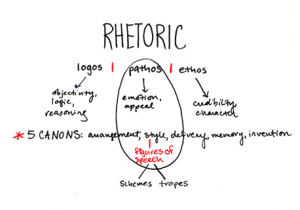
About ten years ago, I took a doctoral class in Mass Communication at the University of Alabama. In part of our discussion, I learned that research begun in the 1940′s began to reveal something very interesting in the field of mass communicating, something I didn’t anticipate. The research showed that mass communication (speeches, advertisements, etc) really wasn’t for the masses. In fact, it’s influence among the masses was limited. Instead, the research showed that all forms of mass communication influenced what became know as opinion leaders. It was the opinion leaders who actually influenced the masses. And those opinion leaders changed depending upon the topic. This was the foundation of what became the Multi step Flow Model.
Plato originated the term rhetoric. However, prior to that many scholars believe the term logos was a precursor to the actual term rhetoric. Now I know there maybe a difference of opinion regarding the validity of that but assume with me for a moment that was the case.
Just for intrigue’s sake, please allow me to bring in some Greek from the Bible. There are two verses in the New Testament that I want to highlight. John 1:1, that says, “In the beginning was the Word (logos)…” Then in verse 14, “and the Word (logos) became flesh…” I realize that logos used here may be a technical term. However, in using it, the biblical writer is noting the relational aspect of the Word (logos).
Let’s now do a little integration. Combine the meaning of logos from rhetoric and the meaning of logos from the biblical writer and what we come up with, in effect, is a relational rhetoric. Persuasion, influence and change happen within the context of both the masses and the minute (not the time, but …read more
Read more here: Systems Thinking






